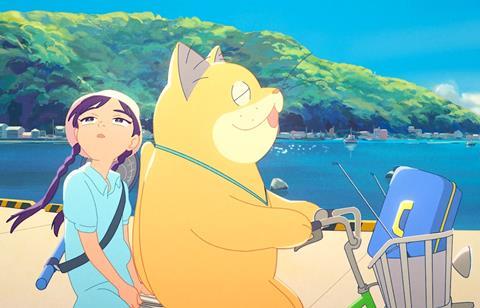Manga adaptation veers wildly in tone but is always claw-cuttingly sharp

Dirs: Yôko Kuno, Nobuhiro Yamashita. Japan, France. 2024. 97mins
The loss of a parent, a de facto family, a supernatural realm, a benign grinning magical entity: there are plenty of story elements in Ghost Cat Anzu that will be familiar to fans of Japanese anime. But this tale of an 11-year-old girl named Karin (voiced by Noa Gotô), abandoned by her feckless widowed father Tetsuya (Munetaka Aoki) to stay with her monk grandfather, and the temple’s laconic ghost cat (Mirai Moriyama), is distinctive in its deceptively abrasive tone and in the wildly out-there swerves of its story. It does suffer slightly from pacing issues and an unwieldy tonal shift in the third act, veering from cuddly, easy-going gentle peril to a full-on demonic onslaught.
This ghost cat has claws
Adapted from a manga, Bakeneko Anzu-chan by Takashi Imashiro, the film is the feature-directing debut of Yôko Kuno, a rising talent in animation and a manga creator. She co-directs with Nobuhiro Yamashita (Linda Linda Linda), an established voice in Japanese cinema, albeit one who has previously worked predominantly in live-action filmmaking. It screens in the main competition at Annecy, having premiered in Directors’ Fortnight in Cannes.
This ghost cat has claws, and, despite his affable appearance and the slow burn of the film’s first hour, he’s probably not suited to younger audiences. This is a cat, after all, whose response to getting his pushbike stolen is to get tooled up with an improvised kitchen knife javelin and then embark on a rage-filled slashing rampage, shredding the shoji room dividers in the temple. But it takes a while before we see the badass side of Anzu, and older kids who might respond to the darker themes and the weirdness of later part of the movie may be turned off by the initial pre-teen ennui, languid pacing and fart gags. Animation buffs, however, will likely be fascinated by the film’s inventive use of rotoscoping, which brings a rare authenticity to the character performances.
From the start, the droll score and the sun-bleached romanticism of the background art (the story mainly takes place in a sleepy coastal small town) work in contrast to the story’s harder edges. Bandaged from a run-in with a loan shark, Tetsuya turns up at his father’s temple. He is clearly a disappointment to the older man and they have not seen each other in years, but Tetsuya wastes no time in getting to the point of his visit – he needs one million yen to pay off the debt that he has accrued. When his father, blustering and red-faced, loses his holy composure and dismisses his son as a “stupid idiot”, Tetsuya leaves his daughter behind, with the vague promise of returning in time for the anniversary of her mother’s death.
Understandably morose, Karin is not immediately receptive to her grandfather’s suggestion that Anzu, the large, chuckling, flatulent ghost cat, should act as her companion and guardian. And Anzu has his own busy schedule – he has a roster of massage clients, and in his spare time he loses huge amounts of money playing pachinko and has altercations with the local police for traffic violations.
One of the film’s strengths is the quality of the voice performances, with Mirai Moriyama’s dryly sarcastic turn as Anzu adding considerably to the comedy. Like Karin, who uses her cute-kid looks and sob story to extort money from soft-hearted acquaintances (she has a group of forest sprites eating out of her hand), Anzu is an opportunistic chancer. But he has a big heart – he lays his own fate on the line to persuade the God of Poverty to leave an ill-starred, sad-sack buddy alone. And Anzu, dressed for the occasion in shorts and a Hawaiian shirt, offers to accompany Karin back to Tokyo and help her track down her errant father and offer prayers at her mother’s grave.
It’s at this point that the story takes a turn into unexpected territory, when the friends discover a portal to hell through the basin of a public toilet. It’s not clear whether the same rule of nine applies to ghost cats, but Anzu probably has a fair few lives clobbered out of him by the end of the unexpectedly violent final act.
Production companies: Shin-Ei Animation, Miyu Production
International sales: Charades sena@charades.eu
Producers: Keiichi Kondo, Emmanuel-Alain Raynal, Miyu Productions, Pierre Baussaron
Screenplay: Shinji Imaoka, from the manga Bakeneko Anzu-chan by Takashi Imashiro
Editing: Toshihiko Kojima
Art direction: Julien De Man
Music: Keiichi Suzuki
Main cast: Mirai Moriyama, Noa Gotô, Munetaka Aoki
























